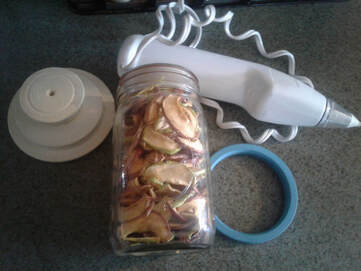|
Another message I keep seeing very frequently is that storing dry foods in glass jars is safe for you to do at home AND that those foods will ALSO be storable for 25+/- years. I would like to address both of these as questions.
1) CAN you store dry foods in glass jars safely at home? OF COURSE! 2) Will those foods last 25+/- years in glass? This is a little more complicated – CAN they last that long properly stored in glass jars? MAYBE – and that is a HUGE maybe. For many reasons. Let’s take a closer look at both of these. In the three decades I have been into food storage, I have used many methods in my home storage programs – large cans (commonly called #10 cans), mylar bags, buckets, and even glass jars – all for dry goods. I have also used several methods of ensuring greater longevity: a professional canning machine which dry seals dry goods into #10 cans, vacuum sealed mylar, vacuum sealed glass jars, plus plastic bottles and buckets sealed with oxygen absorbers, and plastic bottles sealed without oxy packets. When it comes to glass jar dry sealing or vacuum sealing, I want everyone to understand this is simply a dry pack, vacuum sealed method of canning with a home vacuum sealer. I am NOT talking about water bath or pressure canning of wet foods – I am simply talking about dry goods. I have canned or bucketed just about any kind of food: dry milk powders, potato flakes and pearls, beans, grains, pastas, dried fruits and vegetables, sugars, and much more. At one point, I was responsible for putting up and rotating a food storage program that SHOULD last 6 people right around 1 full year. A bit longer if rationed well. It is very important to understand that there are specific requirements when storing dried foods. Those things are: - keep it dry - airtight - keep temperatures between 40 & 60 degrees F if at all possible - out of light, especially sunlight We will go into these in more detail in future blogs, but let's quickly summarize each. Keeping food dry should be obviously important - wet dried foods promote bacteria, fungus, and other foul growth to occur in foods which will cause them to spoil very quickly and may even cause a toxicity that can make people sick, or even die. Keeping foods airtight helps keep foods from spoiling as well because moisture can sneak in through that open-air as well as bacteria and possibly even creatures. Temperature helps maintain lengthier storage times which is important if you do not rotate foods as quickly as some families do. And finally, light destroys nutrients in stored foods. The first three of these can be maintained fairly well in glass jars that are vacuum sealed. However, glass jars allow light in, and in fact block little to no light at all. In some cases they may even magnify the light as it passes through the glass. There are some glass jars that are lightly or even darker tinted, especially greens and browns, but these will only reduce light, not block it well enough. This last reason is the biggest reason why I do not recommend vacuum sealing in glass jars for long term food storage. For our personal storage, I do not dry-pack, vacuum sealed store foods in glass jars for longer than 2 years. AND this two years is HIGHLY dependent upon our home temperature AND the food inside! Foods that are higher in moisture, such as many dried fruits, I do not store more than 6-9 months. This ensures two things: 1) we are eating a nicely balanced, well-rounded diet on a regular basis; 2) we are rotating our foods fast enough to not allow for contamination or deterioration. Some say I am overly cautious, others say I am way too overly cautious! Personally, because something contaminated can seriously be dangerous, I prefer to err on the side of caution and sensibility, rather than risk anyone's health or life. Plus, storing this way just plain tastes really yummy! In recent weeks, while preparing these blogs articles and scripts for videos, I actually learned through the updated information on my top resources that I am no longer actually erring on the side of caution in some cases of specific fruits we store. In fact, some of my resources mention that dehydrating and storing specific fruits and vegetables is ONLY good for 3-6 months. I learned early on that you need to have access to at least 3 reliable resources which teach how to properly store dry foods. No matter how much of an expert we believe we are on a topic, there is ALWAYS changing information. This is especially true in the area of storing foods at home. This changing information often comes through studies done by these reliable resources. My resources almost always originate from or through cooperative extension offices and/or universities. This is because they are always challenging and testing the old methods as well as new ones to help people ensure they are feeding the healthiest and safest foods to their families. These institutions publish regular articles, books, PDFs, and other writings which you can print or purchase to keep on hand in your own notebook or binder in case you have questions. Currently, my favorite links are: #1 - https://nchfp.uga.edu/how/dry.html University of Georgia – National Center for Home Food Preservation. I listed this one as the first one because it is referenced in many other resources I used to use. Right now, it is actually referenced in a few articles on my #3! #2 - https://njaes.rutgers.edu/food-safety/home-food-preservation/ Rutgers University Cooperative Extension - I have followed Rutgers Co-op Extension for decades – I believe I have followed them since I started learning to do home water bath canning way back when I had two little toddlers at home. I find they are very reliable and quite qualified. #3 - https://extension.usu.edu/foodstorage/ Utah State University – Utah is home of one of the largest home food storage centers in the world - the Mormons. Because of their strong beliefs in family preparedness, the universities there do a great bit of study in storage methods. Just looking at the scientific references USU uses to back up their articles shows how in depth this organization goes with their preparedness safety: https://extension.usu.edu/foodstorage/reference Another resource is found on the USDA website. https://www.fsis.usda.gov/wps/wcm/connect/77ffde83-dc51-4fdf-93be-048110fe47d6/Shelf_Stable_Food_Safety.pdf?MOD=AJPERES It is my hope and prayer that this article will help you better prepare your family's food storage system. May it be one that is filled with delicious and healthy foods that will keep your family strong in times of trial and trouble. Whether large or small. Blessings, Judith
0 Comments
|
Authors
Judith has over 30 years experience in food storage, herbs, essential oils, and prepping. She was a captain in the USAF-AUX, FEMA trained, Community Emergency Response Team member and NRA marksmanship award recipient. She shares her experiences with her readers offering tips and recipes. DISCLOSURE: Were a business and may be paid or given free samples of products and services and therefore any information or article contained on this site should not be considered unbiased. Also, these articles may reflect our personal opinions and are provided as news and information only and should never be a substitute for professional, legal , medical or financial. consultation and advice. Conduct your own due diligence and verify the accuracy of each article.
Archives
November 2021
Categories |


 RSS Feed
RSS Feed